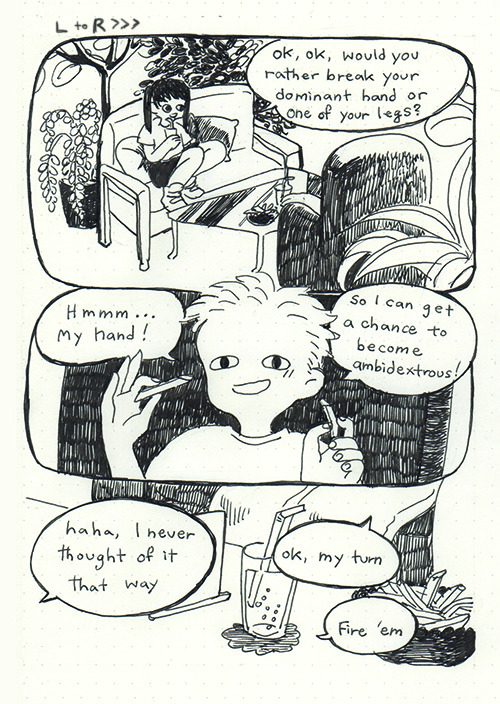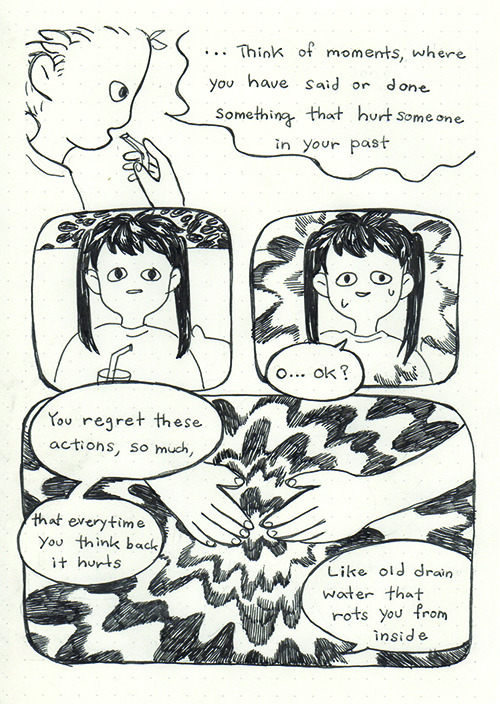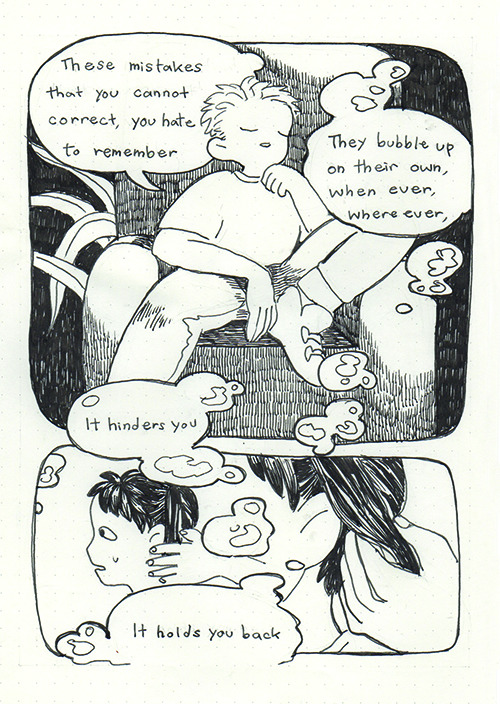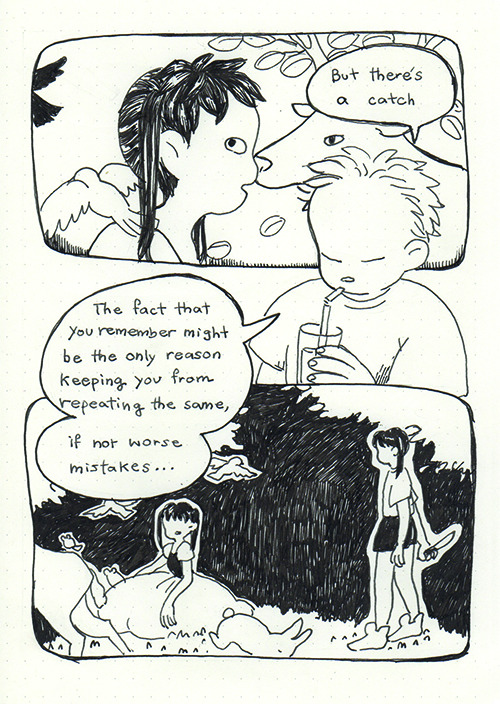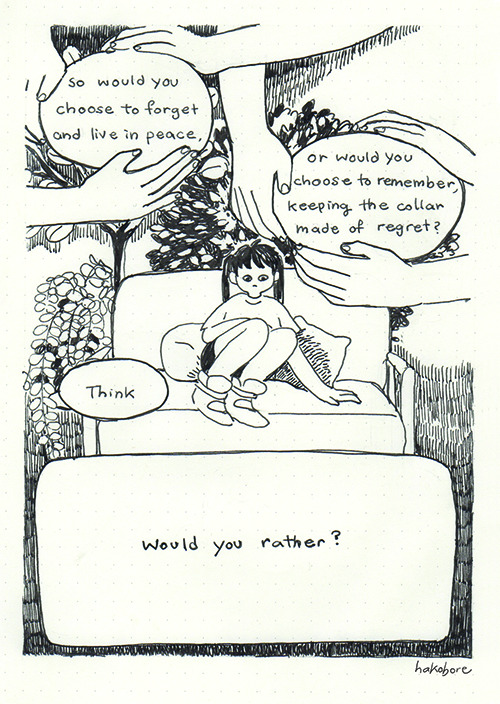we all have them... bigger or smaller. they make us human.
Don't wanna be here? Send us removal request.
Text

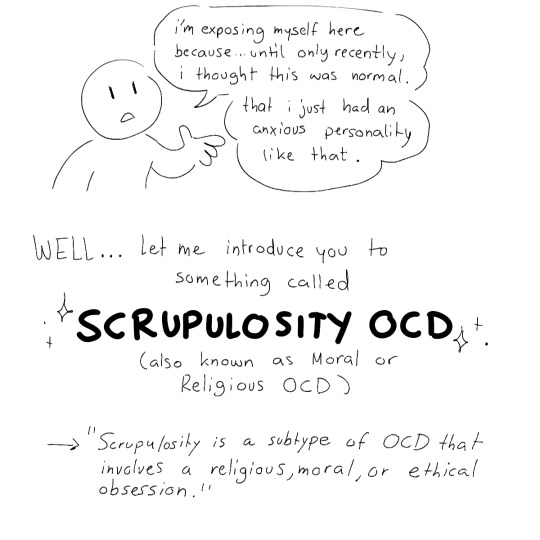

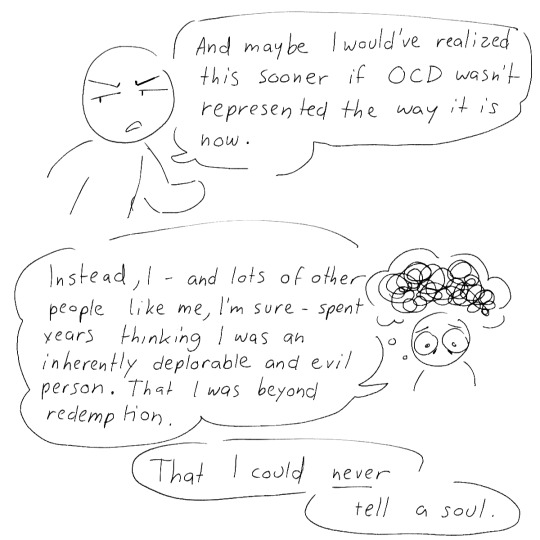


this is just a bunch of text and barely a comic sorry, but i really wanted to talk about this stuff even if i don't have the energy to properly draw
17K notes
·
View notes
Text
yall are pro mental illness until they hallucinate
yall are pro mental illness until they dissociate
yall are pro mental illness until they self-isolate
yall are pro mental illness until they're paranoid
yall are pro mental illness until they split
yall are pro mental illness until it's too Scary for your comparatively neurotypical brain to handle
#bpd safe#bpd favorite person#bpd#bpd splitting#dissociative identity disorder#dissociation#self isolation#borderline splitting#paranoia#neurodivergent#mental illness#origional tags
42K notes
·
View notes
Text
"everybody experiences that" says mother who has the same symptom of the same mental illness
#ethan speaks#get therapy#living like this isnt normal and not everyone experiences this#bpd#paranoia#ocd#ptsd#dissosiation#origional tags
125K notes
·
View notes
Text
there should be an autism autonomy task force where you send them a special email and when they receive it they send a carrier pigeon to your location so you can write a confidential letter telling them about your situation and your needs and if it's urgent they come over and memory wipe everyone who would want to stop you from leaving and they take you and everything you own and put you in government funded housing and say "you live here now and your autism assistant will be arriving each desired day on horseback :)" but not to your face, they use telepathy to communicate concepts that you receive if you wish. and now you're free forever and you can live in the grass outside your house
18 notes
·
View notes
Text
Just a little info for any schizospec or psychotic person :
Internal hallucinations are a thing.
You have "thoughts" that don't sound like your voice?
They work independently of your own thoughts/ inner monologue?
You have multiple going on?
They won't stop even if you're trying to think about something else?
They're louder than your own inner monologue?
They sound like the music you hear in your head when listening to headphones ? Like a in-between thing between your head and ears?
They sound or work exactly like your external hallucinations but inside your head?
They sound like different beings are inside your head talking?
Those are internal hallucinations
There are research paper about it but it's barely talked about. Some psychiatrists don't even believe in them but they're a real and valid hallucination.
A paper I read even talked about how they can be even more distressing than external ones
So if you think you're just having intense racing thoughts or intrusive thoughts, maybe consider if they're actually internal hallucinations
#schizophrenia#schizophrenic#schizospec#psychosis#schizo spectrum#internal hallucinations#hallucinations#origional tags
1K notes
·
View notes
Text
Hallucinating is normal, many people experience it. You have most likely at least passed someone in the street who was hallucinating once. Or you've worked alongside a coworker who was actively hallucinating and you didn't even notice. Or your loved one hallucinated while you were in the room, but they were afraid to tell you.
Hallucinating is common, it's just not commonly talked about in everyday situations. If you don't experience it, or don't know someone who does and tells you about it, you've probably only heard it in the news or on TV. And they only really represent the worst possible outcome for shock value. But that isn't representative of how most of us who hallucinate experience it.
Most of us are just like everybody else, living our lives, just with the addition of hallucinations. We may need to take pills every day, or need therapy, or need to stay in mental hospitals sometimes, or need to be checked on by loved ones, but so do a lot of other people who don't hallucinate.
Hallucinations are just a symptom. Just like anxiety, or trouble concentrating, or tiredness. A lot of people experience it and have to learn to cope overtime. The only difference is we don't generally talk about it to people in casual settings. And it's because of the stigma. If you don't hallucinate, or know someone who does, you probably don't see hallucinations as a normal part of life, a symptom, just a thing plenty of people experience. But it is, it's not special, it isn't more dangerous, it doesn't have to be a huge deal.
Obviously hallucinations can be life changing and horrific, but so can other mental health symptoms. Hallucinations can also be neutral, or just annoying or even a positive experience. It's just a symptom, it doesn't automatically mean someone is in the worst mental state possible if they are hallucinating. It doesn't automatically mean someone is dangerous or unpredictable. It just means a person is experiencing senses that the people around them are not.
You have to learn to accept that it's just a symptom, and that people around you experience it, and they deserve to complain or talk about it just like anyone else gets to with other things in their lives. All you have to do is listen, and try to be understanding. Hallucinating is normal, you just need to stop treating it like it's abnormal.
#everyone needs to start treating people who hallucinate better#especially if you are neurodivergent but dont hallucinate#hallucinations#positivity#schizophrenia#mental illness#nd#neurodivergent#schizophrenic#psychosis#mental health awareness#auditory hallucinations#visual hallucinations#tacticle hallucinations#schizophrenia positivity#psychosis positivity#hallucinating#mental health reminders#mental health matters#origional tags
1K notes
·
View notes
Text
If people in general can understand that someone watching a horror movie might jump in their chair, have their heart rate go up, and feel nervous, even though there is no actual threat in the room, then why can't they understand the same is true for people experiencing psychosis?
They are similar, you are seeing something that isn't actually real, you may believe it's real or not, but either way you will react as if it were real because your brain can't help it. The difference is the person in psychosis isn't seeing it through the safety of a screen, isn't prepared for it and can't immediately turn it off if they want to.
So why is it so hard for people to understand why people in psychosis will react like they are actually experiencing something? Anyone would jump back if an elephant suddenly appeared in front of them. Or be very nervous if they hear their name called when they are home alone. So why are people in psychosis expected to not react, or stop reacting when someone tells them it isn't real?
It really shows a lack of sympathy from people who haven't experienced psychosis, for them to expect us to not have reactions. We are expected to somehow suppress our brains natural reactions, simply for other people's comfort. This applies even more to people of color and homeless people. We are expected to fit the status quo, even when our brains are experiencing something as real.
I say all this to say, try to consider the experience of people with psychosis if you haven't. Don't gawk at people reacting to something you don't see. Try not to fear the homeless person talking to someone that isn't actually there. Don't make fun of, or judge people for reacting to something they are experiencing, just because you don't experience it.
#schizophrenia#mental illness#nd#neurodivergent#schizophrenic#psychosis#mental health awareness#hallucinations#delusions#schizophrenia awarness#psychosis awarness#origional tags
2K notes
·
View notes
Text
Psychosis is so much more than hallucinations and delusions.
It's disorganizing phrases and sentences. Instead of saying "I lost my bag" you end up saying "I bag my lost".
It's saying something out loud and hearing it echo in your head, only to completely forget what you said, or why.
It's lacking words and the ability to organize them in a sentence so that they make sense.
It's thinking you wrote something only to find out you wrote something else.
It's suddenly losing track of what you were telling someone, or thinking.
It's unknowingly misreading words, somehow sensing the sentence doesn't make sense, reading it again and realizing you read half the word or a completely different word.
It's your mind going blank and feeling a need to stay still and stare at nothing in particular.
It's repeating words and phrases for no apparent reason.
It's having an insight or remembering something you want/have to do only to lose it within seconds.
It's not being able to tell if something actually happened or it was a dream.
It's not being able to tell if a memory was a dream, a made up story/memory, or an actual situation in which you were experiencing positive symptoms.
It's losing track of time, feeling it goes too slow or too fast, or that it freezes.
#psychosis awareness#psychosis#psychotic culture is#psychotic break#actually psychotic#psychotic#psychotic disorders#cluster a#auditory hallucinations#actually hallucinating#hallucinations#schizotypy#schizo spectrum#schizophrenic spectrum#schizospec#schizotypal personality disorder#schizophrenia#schizoaffective#schizotypal pd#origional tags
3K notes
·
View notes
Text
expressing that you're in a fucked up situation is so isolating when it's not common enough for people to understand or relate to, sometimes you just have the emotional need to say something when you've already bothered everyone close to you by trying to get their help
20 notes
·
View notes
Text
you're not an horrible person you are 15 years old
34K notes
·
View notes
Text
Hey, you are not an embarrassment for not knowing how to do certain household chores/basic self-care. They do not come naturally to us. A lot of it takes practice! Maybe you had a neglectful guardian. Maybe you had one that was very coddling and never thought to teach you. Maybe you haven't lived in a place where these things were available to you or needed. Doesn't matter. It's okay to not know and far more common than you might realise.
That said, this website provides very simple instructions on how to do everyday tasks such as making your bed, using a washing machine, cooking different foods, washing dishes, taking a shower, etc. All you have to do is use the search bar to find the task you're struggling with, and it'll come up with what you need + other related how-to's:)
If you're having trouble navigating it, let me provide you with some examples:
How to clean dishes by hand
How to make your bed (with visual demonstrations of each step!)
How to fold clothes (with visual demonstrations of each step!)
How to take a shower & dry yourself off (also provides ways to shave beards, armpits, legs and genitals)
How to shave legs, armpits, beards, pubic areas, etc. (a more in-depth guide)
How to mop the floor
How to sweep the floor
How to swallow pills
How to make small talk
How to make eye contact in different situations (or how to avoid it while still looking natural)
It's also perfectly okay if these don't help or aren't appealing to you. Unfortunately, nothing helps everyone.
103K notes
·
View notes
Text
Not so commonly talked about/Atypical Autism Traits
Autism has so many traits and manifestations that aren’t commonly discussed or talked about! Frequently, doctors ignore the atypical/”uncommon” traits dismissing and not writing or educating others about them. A lot of doctors have set definitions of autism that aren’t really representative of the autistic community as a whole. Atypical traits in actuality are more common and prevalent than stereotypical ones they just often go ignored therefore less people know about them.
Also, “professionals” often create lists saying atypical traits are gender specific and use functioning disgusting labels to invalidate traits as well as experiences. Autism traits are not different for “boys” or “girls.”. There is a lot of transphobia, misogyny, intersexism, racism, ableism as well as various other forms of oppression in the psychaitric field especially in regards to autism. The sources below do contain unnecessary functioning labels and gendering. Please ignore that and know autism traits aren’t gender specific and that there is no such thing as “severe” and “mild” autism. Autism is a spectrum and every single autistic person manifests autism differently.
Additionally, some traits aren’t just specific to autism but are also traits of various other neurodivergences as well as common among neurotypicals.
Keep reading
11K notes
·
View notes
Text
collection of useful things tumblr has taught me:
even if you can't fall asleep, laying down with your eyes closed will still rest your body
you don't have to brush your teeth standing up
you don't have to do any chore standing up, from dishes to showering
you don't have to shower with the lights on
if you can't brush your teeth, flossing and a tongue scraper gets rid of plaque and bad breath
if you can't do that, mouthwash kills a lot of bacteria
eating "unhealthy" food is better than eating no food
you can make the same meal everyday for however long you still want it
some pills come in syrups or chewables if you can't swallow them
kids nutritional shakes can be a quick way to get fuel if you can't eat/don't have time
if walking hurts/exhausts you on a regular basis, canes and rollers are for you, no matter how young you are
we have free will—if doing something "out of the ordinary" makes life easier for you, do it
82K notes
·
View notes
Text
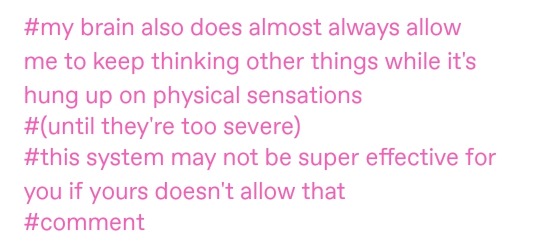
Yeah, unfortunately for me, I just get stuck, I can't do anything, it really overstimulates and/or overwhelms me.
The last time I was hungery, I curled up on the floor and couldn't move because I didn't know what I was feeling but hated how uncomfortable I felt.
And other times my brain will try to compensate and get it completely wrong.
One time I was tired and my brain mistook it for being thirsty, so I just drank a bunch of water and it didn't help-
it does feel nice that I'm not entirely alone in this, and I'm thankful for your tip♥︎
My brain has a really hard time figuring out my body signals-
Like normal people get:
My head hurts > I have a headache > I'm dehydrated > I need to drink water
But I just get:
my head hurts my head hurts my head hurts my head hurts my head hurts my head hurts my head hurts my head hurts my head hurts my head hurts my head hurts my head hurts my head hurts my head hurts my head hurts
and doesn't go down the path and realize "oh, I need to drink water"
no, I have to be told
Anyone else?
#neurodivergent#neurodivergent issues#neurodivergent struggles#adhd#actually adhd#autism#probably autistic#idk im just trying my best
15 notes
·
View notes
Text
My brain has a really hard time figuring out my body signals-
Like normal people get:
My head hurts > I have a headache > I'm dehydrated > I need to drink water
But I just get:
my head hurts my head hurts my head hurts my head hurts my head hurts my head hurts my head hurts my head hurts my head hurts my head hurts my head hurts my head hurts my head hurts my head hurts my head hurts
and doesn't go down the path and realize "oh, I need to drink water"
no, I have to be told
Anyone else?
#just me?#adhd#actually adhd#possibly autistic#autism#neurodivergent#neurodivergent struggles#neurodivergent issues
15 notes
·
View notes















